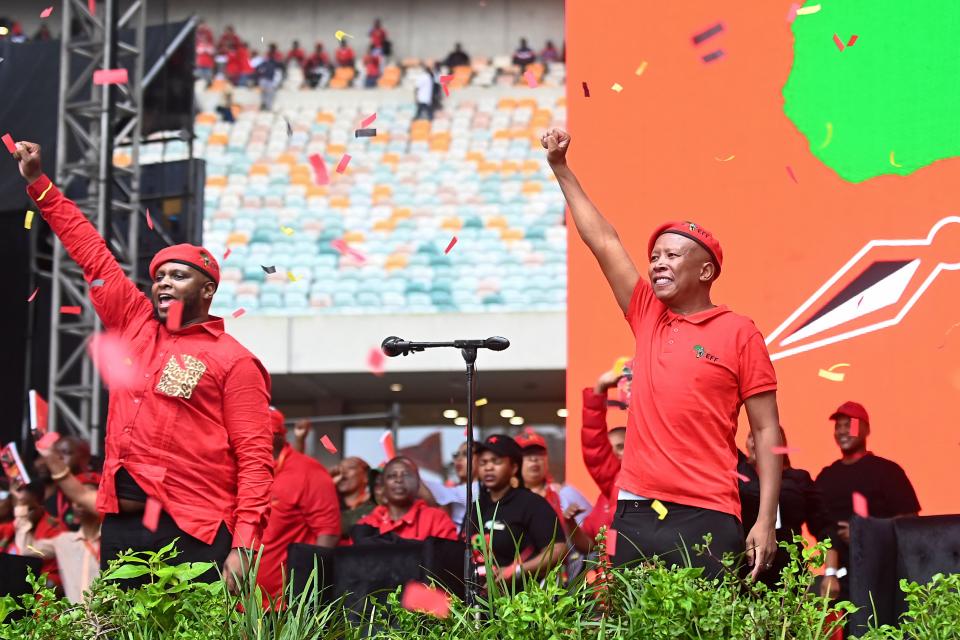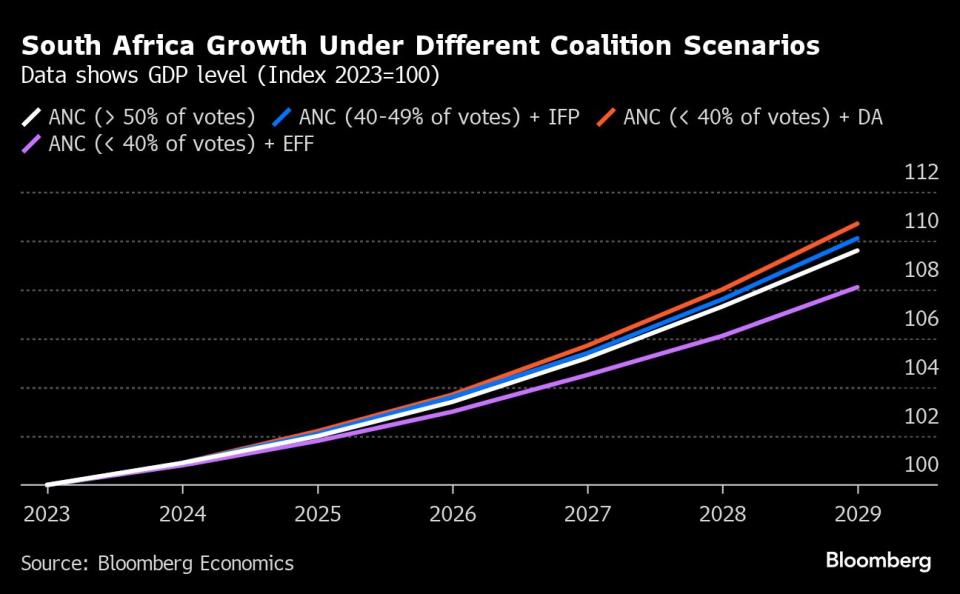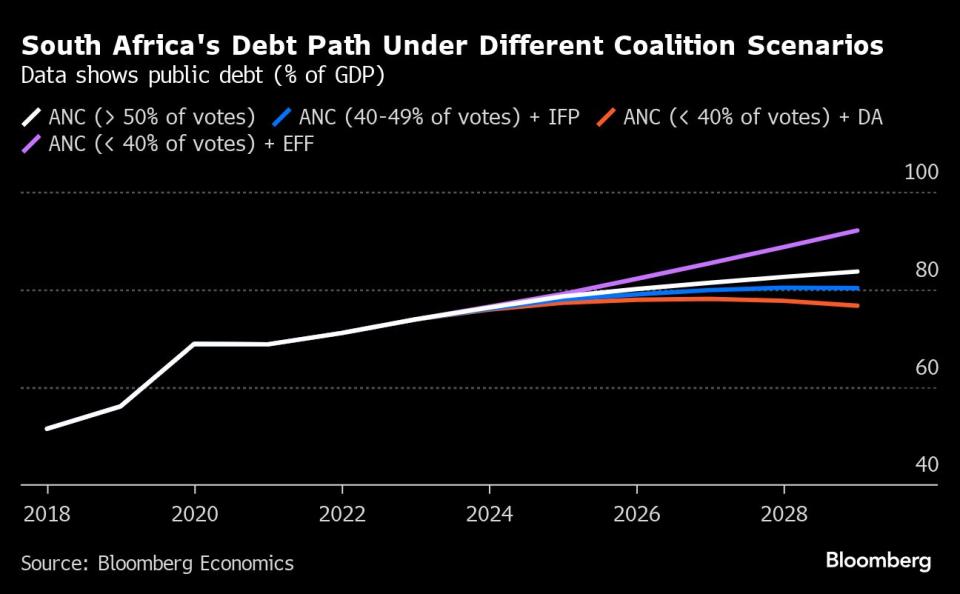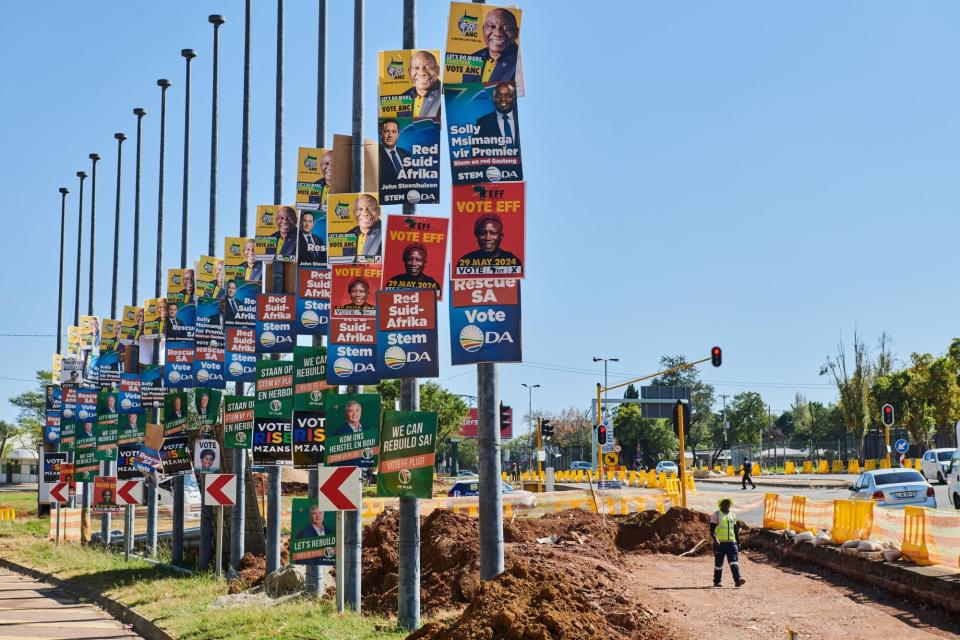South Africa’s Election Poses Risks to Economy That Is Finally on the Mend
(Bloomberg) -- South Africa is on the verge of an economic turnaround after years of stagnation. This week’s election puts that at risk.
Most Read from Bloomberg
Israeli Airstrike and Egyptian Guard’s Death Ratchet Up Tensions
Wall Street Moves to Fastest Settlement of Trades in a Century
Catering to the Ultra-Rich Is a Booming Business in Australia
For Private Credit's Top Talent, $1 Million a Year Is Not Enough
Opinion polls show the African National Congress is in danger of losing its national majority on Wednesday for the first time since Nelson Mandela led it to power in 1994, ending White-minority rule.
The ANC has shed support because of graft and mismanagement on its watch. But the party has been on a cautious pro-growth path since President Cyril Ramaphosa took over in 2018 and the best result for investors, according to Bloomberg Economics, is one that keeps him in office.
Some investors are betting that’s exactly what’s going to happen, driving a recent rally in the rand. A Bloomberg survey of emerging-market specialists found most of them overweight or neutral on the country, reflecting optimism it will avoid a post-election populist shift.
Ramaphosa’s reforms are slowly bearing fruit, which analysts see helping lift economic growth to 1.1% this year from a measly 0.6% in 2023 and advancing further in 2025. That might not be much, but it could get a lot worse, depending on how badly he fares in the vote. A couple of polls have shown ANC support falling below 40%.
If the ANC dips under 50%, it will be pushed into a coalition government. Dropping a bit under that threshold likely means teaming up with a smaller rival who will go along with Ramaphosa’s agenda.
But larger losses could force it into a pact with one of the main opposition parties, and a couple of those options look pretty scary to foreign investors.
They range from the business-friendly Democratic Alliance, led by John Steenhuisen, to the leftist Economic Freedom Fighters led by firebrand Julius Malema and former President Jacob Zuma’s uMkhonto weSizwe Party. The latter two want to nationalize the central bank and expropriate land without compensation.
"Foreign investment would be very cautious to invest into the country, certainly until they've seen the roadmap of policy," said Trevor Garvin, head of multi-management for Nedgroup Investments.
First prize for investors would be an ANC-DA tie-up. Neither have warmed up to that idea yet, though the DA has not closed the door on one to prevent what it calls the “doomsday scenario” of an ANC-EFF government.Read more: South Africa’s Election Matters for the World: John Micklethwait
Uncertainty over whether the election delivers a sharp lurch to the left or it’s business as usual is causing some to hesitate. Companies have stockpiled cash at twice the rate of inflation ahead of the polls and foreigners remain net sellers of stocks.
“You’ll have business sit on the sidelines,” said Kevin Lings, chief economist at Stanlib Asset Management Ltd. “That degree of uncertainty can last for a chunk of time. Months. Maybe a year.”
Bloomberg Terminal clients can click on ELEC ZA for more on South Africa’s elections
Such cause for pause could be costly when South African growth is finally shifting onto a firmer footing.
“While business holds back on a lot of stuff, what they don’t want to feel is they are losing out if things start to go well,” said Lings. But business won’t invest amid coalition uncertainty and “that’s a lost opportunity.”
Bloomberg Economics examined the possible election outcomes and what they may mean for the economy and policy:
ANC Retains Majority Vote, Policy Continuity
Opinion polls don’t suggest this, but the ANC could still retain its majority if the opposition splinters and voters keep faith with the party.
Policy direction:
In this scenario there would be little change in policy:
With unemployment running at 32.9%, job creation via public works programs will remain a key ANC goal.
Growth through industrialization is another ANC objective and it will keep pursuing broader economic ownership to reduce the nation’s gaping levels of inequality.
Land reform to redress the historic injustices of White-minority rule will also stay on the front burner.
Economic impact:
Growth will likely pick up from around 1% in 2024 to 1.7% in 2026, falling short of the country’s 2% long-term average because of interest rates at a 15-year high, power outages, and low investment outside of the energy sector. Looking further out, growth may rise above 2% as ongoing reforms in sectors such as power and logistics begin to bear fruit.
Inflation will remain sticky until year end, holding above the 4.5% midpoint of the central bank’s target band. This will likely delay rate cuts until late 2024.
The rand has made significant gains against the dollar since the end of April. Further advances are likely in the event of an ANC majority because South African assets look cheap, rates are high and an ANC win would calm the market by signaling policy continuity.
ANC With 40-49% of Vote, Policy Implementation ExpeditedThe ANC has suffered a steady decline in its share of the national vote, dropping from 69.7% in 2004 to 57.5% in 2019 and dipping to 45.6% in the 2021 local government elections. The trend suggests this is the most likely scenario from Wednesday’s ballot, compelling it to form a coalition with one or two small opposition parties, most likely including the Inkatha Freedom Party.
Policy direction:
Policy changes are unlikely in this scenario because the ANC will be able to pick a partner that shares a similar vision. The IFP looks like the most natural fit.
Small coalition partners will serve as an internal check within the government but won’t push for major strategic shifts. That could deliver faster policy implementation and limit corruption.
The IFP’s manifesto suggests the party will likely seek an increase in social grants and free basic education, bringing pressure to bear on public spending and debt issuance.
Economic impact:
Faster implementation of reforms will support a brisker pick-up in growth to 2% over the medium term. Government spending on health and education will likely increase. Higher social spending will be mitigated by less public sector waste and stronger tax revenue.
The rand is likely to initially falter on news the ANC has lost its majority. But the formation of an ANC-IFP government in the following days calms markets, triggering a rebound. That will help to keep inflation heading lower, supporting a rate cut sooner rather than later.
Most Read from Bloomberg
ANC’s Vote Falls Below 40%, Policy Pragmatism
If the ANC vote falls below 40%, an alliance with the EFF or the DA becomes more probable. Polls have shown Zuma’s MKP eating into the EFF vote, but still trailing it, so if the ANC shifts left, it’s more likely toward Malema than its former leader.
Policy direction:
The ANC is more likely to form a coalition with the DA than the EFF because their policy differences are narrower and the EFF demands are expected to include the position of deputy president or finance minister.
Key DA priorities include establishing a debt ceiling; tax reform that favors business and investors; and easing restrictive labor laws to boost hiring. It also wants to ban civil-service cadre appointment — where the ruling party deploys its own people to key government posts — to improve public service delivery.
Economic impact:
An ANC-DA tie up would see investment pick up, supporting quicker growth and job creation. But gains would be limited by the difficulty the DA would find in championing significant policy change as the junior partner in the coalition. Debt will likely stabilize over the next couple of years, helped by the DA’s focus on better fiscal discipline. The rand will respond positively to a business-friendly party in government, supporting moderate inflation and lower rates.
In the scenario where the ANC forms a government with the EFF, the leftist party would push for broader ownership of the economy by accelerating existing employment and land reform policies. This initially hurts investor sentiment. But recent episodes of leftist gains in Latin America suggest their leaders tend to tone down their rhetoric and are more pragmatic once elected. A similar turn by the EFF is likely, suggesting the rand will retrace after an ANC-EFF government takes power as this becomes clear. Rate cuts may be pushed out to late 2025, once price stability is restored. Growth remains modest and below 2% for the next few years. Government borrowing stays high to finance job-creating work programs, delaying debt stabilization as a share of the economy into the next decade.
Most Read from Bloomberg Businessweek
The Dodgers Mogul and the Indian Infrastructure Giant That Wasn’t
A Hidden Variable in the Presidential Race: Fears of ‘Trump Forever’
©2024 Bloomberg L.P.










